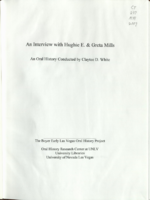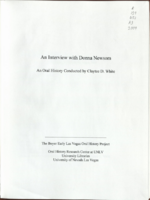Search the Special Collections and Archives Portal
Search Results

Qiong Liu interview, June 8, 2016: transcript
Date
Archival Collection
Description
Interviewed by Claytee White. Dr. Liu is the City Manager for the City of North Las Vegas. Discusses housing, diversifying the economy, Apex, Faraday and negotiations to secure that business for North LV.
Text

Transcript of interview with Cindy Coletti and David Fordham by Stefani Evans and Claytee White, October 27, 2016
Date
Archival Collection
Description
The interior of the green house at the end of the cul-de-sac envelops the visitor. Every room exudes comfort and encourages conversation even as the lake, lapping quietly on three sides of the house, beckons. Cindy Coletti revels in this house and its interiors, all of her own design, especially because they are so different from the daring, opulent, and award-winning custom homes for which she is known. Arriving in Las Vegas in 1988 as a single mother, Cindy immediately submitted a successful design for the first Southern Nevada Street of Dreams event and began networking. She established Sun West Custom Homes in Nevada by applying the design and contracting skills she had successfully honed by building nearly seventy houses in California, Florida, and Colorado—all the while grooming her son Danny—from the time he was in his teens—to eventually take over the company. In this interview, Cindy's husband, David Fordham, shares his background, his reasons for relocating to Las Vegas, work in commercial real estate, meeting Cindy, and living at The Lakes. Cindy then recalls the experiences that brought her to Las Vegas; shaped her ideas of self-help, friendship, design, and business, and instilled in her the confidence to succeed in a man's world. Cindy has retired from building and now enjoys traveling with her husband, but Sun West Custom Homes continues to thrive under the capable ownership and leadership of Daniel S. Coletti.
Text

Nanyu Tomiyasu interview, April 12, 1977: transcript
Date
Archival Collection
Description
On April 12, 1977, collector Mark French interviewed Nanyu Tomiyasu (born May 28th, 1918 in Las Vegas, Nevada) at the University of Nevada, Las Vegas. In this interview, Nanyu Tomiyasu discusses growing up and working on his father’s (Bill Yonema Tomiyasu) farm in Las Vegas, Nevada. He also discusses how his father came to Las Vegas and being one of the few Japanese families in Las Vegas as a child.
Text

Joe Cortez interview, November 29, 2018: transcript
Date
Archival Collection
Description
It is February 20th, 1995, the world’s eyes are set on El Estadio Azteca, Mexico’s largest sports stadium. Inside the facility, in front of an estimated 130,000 people, Mexican legend, Julio César Chávez, is defending his WBC super-light weight title against the American, Greg Haugen. In front of his countrymen, Chávez is punishing Haugen, who disrespected him years earlier in Las Vegas. During the 5th round, Haugen is barely able to stand on his feet, as the record breaking crowd calls for him to be knocked out. Chávez continues to land a barrage of punches, until finally the third man in the ring that night decides to step in to put an end to it. The stadium erupts with cheers for El León de Culiacán. The history books remembers this fight as the largest outdoor fight in the history of the sport. Casual boxing fans will always remember Chávez and Haugen battling it out in the heart of Mexico, but a third man stood in the ring that night: Joe Cortez. Cortez was born to Puerto Rican parents in Spanish Harlem, New York City. Boxing was always a part of this Hall of Fame referee’s life. Cortez won multiple Golden Glove tournaments as an amateur boxer and had a successful, but short career as a professional boxer. Outside of boxing, Cortez also found success as military man, deli owner, hotel manager, and director of an ophthalmologist outreach program. Eventually, he would find himself back in the boxing ring, this time as a referee. His career as a referee took Cortez to the top of the boxing world. When he retired in 2012, Cortez officiated 176 World Championship Fights. In 2011, Cortez was inducted in the International Boxing Hall of Fame alongside, Mike Tyson, Julio César Chávez, Kostya Tszyu, Ignacio Beristain, and Sylvester Stallone.
Text

Transcript of interview with Catherine Hunt by Dennis Hunt, March 2, 1980
Date
Archival Collection
Description
On March 2, 1980, Dennis Hunt interviewed his mother, Catherine Hunt (born August 25, 1932 in Palmyra, Missouri) about her life in Southern Nevada. The two discuss Catherine Hunt’s work as a secretary before becoming a housewife. The interview concludes with Catherine Hunt’s thoughts on population growth, women’s rights, and the Equal Rights Amendment.
Text

Transcript of interview with Georgie Clark by Steven E. Pilgram, March 2, 1980
Date
Archival Collection
Description
On March 2, 1980, Steven E. Pilgram interviewed river runner, Georgie Clark (born on November 13, 1910 in Chicago, Illinois) at Sambo’s Coffee Shop in Las Vegas, Nevada. This interview is an in-depth discussion about the Colorado River area, including changes, and new rules and regulations. Georgie also recalls working as a real estate agent and as a ferry command, civil servant in World War II.
Text

Transcript of interview with Clark Crocker by Monica Lehman, March 3, 1978
Date
Archival Collection
Description
On March 3, 1978, Monica Lehman interviewed Clark Crocker (born 1920 in Westfield, Massachusetts) about his experiences while living in Nevada. Crocker first talks about his family and educational background before describing his experiences from going to school in both California and Massachusetts. Crocker then describes what he knows about the building of Hoover Dam and later talks about his career as a teacher and school principal. The two also discuss Crocker’s hobbies and volunteer work, including that for the fire department in Pahrump, and they later discuss Crocker’s experiences as both a frogman and navigator for the United States Navy during World War II. The interview concludes with some of Crocker’s thoughts and philosophies on how curriculum should be structured in schools.
Text

Transcript of interview with Hughie and Greta Mills by Claytee White, April 7, 2011
Date
Archival Collection
Description
Hughie and Greta Mills spent their childhoods in Charlestown, West Virginia. Fate would bring them together years later in New York City. They married in 1954. Both Hughie and Greta talk about achieving a better life through education and perseverance. He became an educator and she a librarian. In 1989, the couple relocated to Las Vegas, seeing the weather and retirement lifestyle here to their liking. During this interview they describe their lives, individually and as a couple, and how they embraced life and living in Las Vegas as a retired, African- American couple.
Text

Transcript of interview with Donna Newsom by Claytee White, June 11, 2009
Date
Archival Collection
Description
Donna Newsom shares the history of her life in great detail, beginning with her childhood in Georgia and Florida. The family moved many times, following her father's work opportunities. Donna had a close relationship with her father and recalls the many daring adventures on which he took her. After graduating from high school, Donna earned a nursing degree at the Macon Hospital School of Nursing. She remembers dorm life, long hours, and the specific training nurses received in the late forties. Her career began at age 19 with a year of working at Macon Hospital as a graduate nurse, and then she made plans to leave the South. Donna's memories include moving to Houston, living in a boarding house, her first date, and working at Hermann Hospital and then Methodist Hospital. She then answered an ad to work at a Girl Scout camp in Colorado, and her roommate there became a mentor and one of her staunchest supporters. With help from her mentor, Donna went on to earn a teaching degree in Austin, Texas, met and married her husband Sam Newsom, and got involved in real estate. She relates the many experiences they had during Sam's Navy career, her teaching experience in New Orleans, and their eventual move to Las Vegas. Sam and Donna loved Las Vegas from the moment they moved here. She recalls many details of her employment at UMC, the differences in health care compared to down south, and the feeling of being safe no matter the time of day or night. Donna stays active in tutoring, the OLLI program at UNLV, and working for the Salvation Army women's auxiliary. She and Sam also get together with his golfing buddies and their wives for dinners in their various homes.
Text

Transcript of interview with Kim Bird & Pam Fogliasso by Claytee D. White, February 8, 2013
Date
Archival Collection
Description
Kim Bird's family moved to Las Vegas in 1955 when she was twelve years old. Pam Fogliasso arrived in 1954 with her family in 1954, when she was ten. Kim married and had a son and a daughter; she lives in Las Vegas. Pam married, had two children, and lives in Parumph, Nevada. Though Kim and Pam moved here in the mid-1950s, they had family members who had lived in Southern Nevada and worked on building Hoover Dam - Kim's grandfather and Pam's great-uncle. Both women remember growing up in a Las Vegas that was run by the mob and safe for teenagers; meeting friends in local hangouts such as the Blue Onion and attending sock hops, babysitting, and cruising down Fremont Street. They attended high school with black students but were also aware of the segregation that existed on the Strip. This interview focuses on Kim and Pam's experiences growing up in Las Vegas, and on their teenaged years attending Rancho High School.
Text
